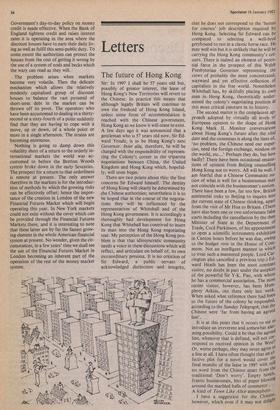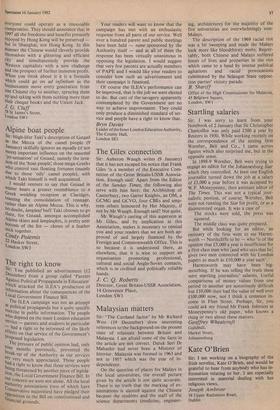Letters
The future of Hong Kong
Sir: In 1997 I shall be 57 years old but, possibly of greater interest, the lease of Hong Kong's New Territories will revert to the Chinese. In practice this means that although' legally Britain will continue to own the freehold of Hong Kong Island, unless some form of accommodation is reached with the Chinese government, Hong Kong as we know it will cease to exist. A few days ago it was announced that a gentleman who is 57 years old now, Sir Ed- ward Youde, is to be Hong Kong's next Governor. Inter alga, therefore, he will be charged with the responsibility of represen- ting the Colony's corner in the tripartite negotiations between China, the United Kingdom and Hong Kong which, hopeful- ly, will soon begin.
There are two points about this: the first concerns Sir Edward himself. The destiny of Hong Kong will clearly be determined by the Chinese authorities; nevertheless it is to be hoped that in the course of the negotia- tions they will be influenced by the representatives of Whitehall and of. the Hong Kong government. It is accordingly a thoroughly bad development for Hong Kong that Whitehall has contrived to insert its man into the Hong Kong negotiating seat. My perception of the Hong Kong pro- blem is that that idiosyncratic community needs a voice in these discussions which will reflect, and articulate on behalf of, its own extraordinary persona. It is no criticism of Sir Edward, a public servant of acknowledged distinction and integrity, that he does not correspond to the 'horses for courses' job description required by Hong Kong. Selecting Sir Edward can be compared to selecting a well-bred greyhound to run in a classic horse race. He may well win but it is unlikely that he will be carrying the Hong Kong community's col- ours. There is indeed an element of poten- tial farce in the prospect of this Welsh Presbyterian Governor representing the views of probably the most concentrated, wayward and yet effective collection of capitalists in the free world. Nonetheless Whitehall has, by skilfully placing its own man in Hong Kong, theoretically under- mined the colony's negotiating position at this most critical juncture in its history.
The second matter is the complacent ap- proach adopted by virtually all levels of European opinion to the shape of Hong Kong Mark II. Monitor conversations about Hong Kong's future after the vital date and the consensus is along the lines of 'no problem, the Chinese need our exper- tise, need the foreign exchange, window on the world, etc...' Perhaps they do, but how badly? There have been occasional emana- tions of opinion from Beijing counselling Hong Kong not to worry. All will be well. I am fearful that a Chinese Communist no- tion of what is well for a businessman maY not coincide with the businessman's notion. There have been a few, far too few, British ministerial treks to Beijing to inquire into the current state of Chinese thinking, apart from the visit of Mr Hua to Britain. (There have also been one or two unfortunate false starts including the cancellation by the then Minister of State at the Department of Trade, Cecil Parkinson, of his appointment to open a scientific instruments exhibition in Canton hours before he was due, owing to the budget vote in the House of Com- mons. Not an intelligent manner in which to treat such a mannered people. Lord Car- rington also cancelled a previous trip.) Ed- ward Heath has been the most constant visitor, no doubt in part under the auspices of the powerful Sir Y-K. Pao, with whom he has a commercial association. The most recent visitor, however, has been Hunt' phrey Atkins, out there only last week' When asked what reference there had been to the future of the colony he responded, according to the Sunday Telegraph, that the Chinese were 'far from having an agreed line'.
It is at this point that it occurs to me to introduce an irreverent and somewhat afar' ming possibility. Could it be that the agreed line, whenever that is defined, will not CO' respond to received opinion in the West. Or, worse perhaps, they may never agree to a line at all. I have often thought that an ef- fective plot for a novel would cover th.e . final months of the lease in 1997 with stilt no word from the Chinese apart from the traditional 'Don't worry'. Empty hotels, frantic businessmen, bits of paper blowing around the marbled halls of commerce .
A kind of Town Like Alice atmosphere. I have a suggestion for the Chinese: however, which even if it may not delight
everyone could operate as a reasonable compromise. They should announce that in 1997 all the freedoms and benefits presently enjoyed by Hong Kong will be preserved but in Shanghai, not Hong Kong. In this manner the Chinese would cleverly provide themselves with a glittering and efficient city and simultaneously provide the Western capitalists with a new challenge and the prospect of further immense profit. When you think about it it is a formula which could go on ad infinitum as the businessmen move every generation from one Chinese city to another, sprucing them up and taking with them nothing more than their cheque books and the Union Jack. J. G. duff 58 St James's Street, London SW I



































 Previous page
Previous page